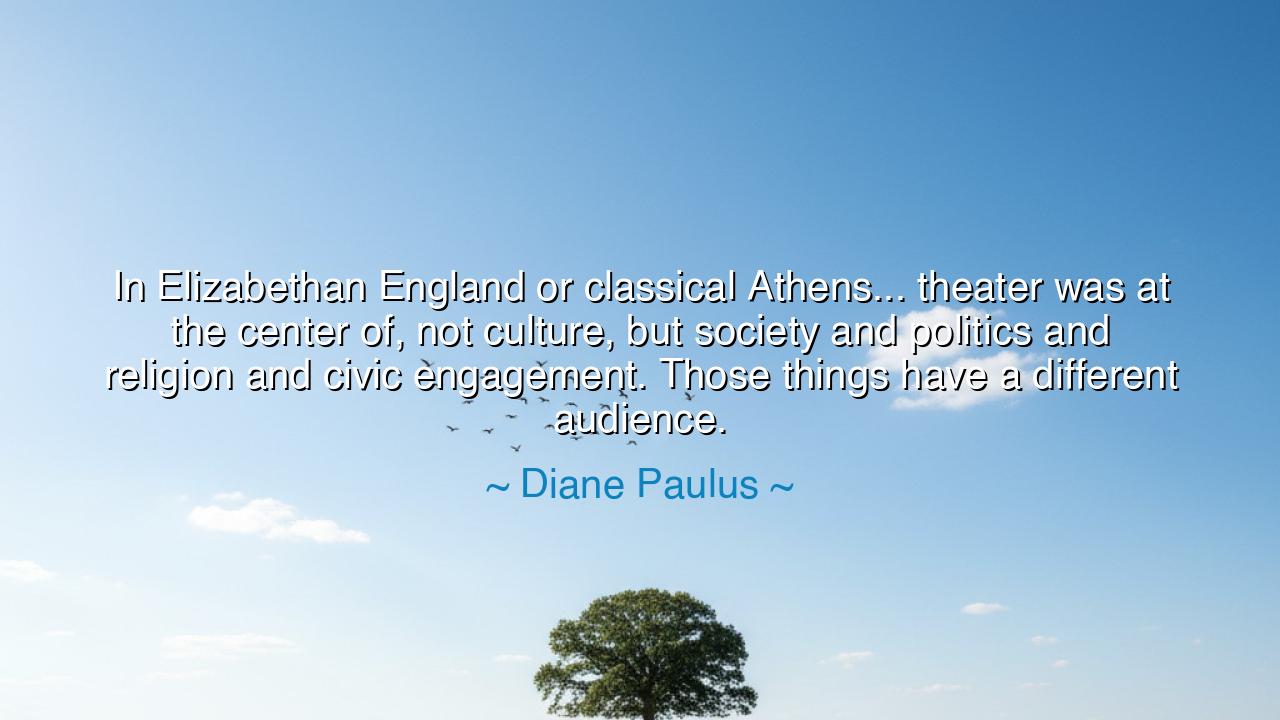
In Elizabethan England or classical Athens... theater was at the
In Elizabethan England or classical Athens... theater was at the center of, not culture, but society and politics and religion and civic engagement. Those things have a different audience.






Hear, O listeners, the words of Diane Paulus, keeper of the stage and seeker of truth: “In Elizabethan England or classical Athens... theater was at the center of, not culture, but society and politics and religion and civic engagement. Those things have a different audience.” In these words she unveils an ancient reality—that the theater was never merely entertainment, but a living mirror, a gathering place where people beheld themselves, their gods, their rulers, and their very destiny. The stage was not a diversion from life; it was the beating heart of life itself.
In classical Athens, the theater was born as an offering to Dionysus, god of wine and ecstasy, but it quickly grew to become the very arena of civic discourse. Tragedies of Aeschylus and Sophocles did not merely recount myths; they wrestled with questions of justice, fate, war, and mercy. Comedy in the hands of Aristophanes was no idle jest—it was a weapon sharper than the sword, mocking politicians, exposing corruption, stirring debate in the marketplace. The citizens gathered not only to be amused, but to be awakened, to be drawn into the shared work of the polis.
So too in Elizabethan England, the stage was the great common ground of the people. At the Globe Theatre, nobles and laborers alike stood side by side, listening as Shakespeare wove tales of kings and clowns, betrayal and redemption. Yet beneath the poetry lay commentary on monarchy, ambition, power, and the fragility of the human soul. Theater was not merely art; it was politics, religion, and society laid bare. Audiences came not to escape reality, but to confront it in a form more vivid than life itself.
History gives us examples of the stage shaping nations. When Henry V was performed, audiences saw not only a play but a call to unity in times of war. When “Julius Caesar” was staged, whispers of political assassination in England lent it dangerous resonance. In Athens, when Euripides portrayed the suffering of Trojan women after conquest, he forced the victors themselves to confront the cost of their triumph. Thus the theater stood as prophet, teacher, and judge, holding power accountable and stirring the conscience of the people.
Paulus warns us that today such a role has faded. Theater, once the fire at the center of civic life, has often been reduced to a niche for the privileged or the few. Its audience has changed, no longer the full body of society but select circles. What was once a place where the soul of the city was laid open has become, too often, a pastime apart from politics, faith, or the urgent struggles of the people. Her lament is a call to remember the ancient role of performance as civic engagement, not simply art for art’s sake.
The meaning of her words is clear: the stage is a mirror of humanity, and when it is severed from politics, society, and religion, it loses much of its power. Art must not hide from the struggles of its people but must enter them, wrestle with them, and reveal them. For a play is not merely words spoken, but a spark that can ignite conscience, stir rebellion, or inspire compassion.
The lesson for us is urgent. Seek the theater that awakens, not the theater that lulls. Support art that challenges injustice, that questions power, that reveals truth. And in your own life, do not treat performance and storytelling as diversions, but as sacred acts that can transform both you and your community. For every story told is a seed planted in the soul of the audience, and from such seeds nations rise or fall.
Practical actions stand before you: Attend plays that grapple with the questions of your age. Share stories that confront, not only those that entertain. Teach the young that art is not escape but engagement, not silence but voice. And if you are a creator, dare to place your work at the center of life’s great debates, as did the ancients. For if the stage once carried the weight of society, politics, religion, and community, it can do so again, if only we have the courage to restore it.






AAdministratorAdministrator
Welcome, honored guests. Please leave a comment, we will respond soon